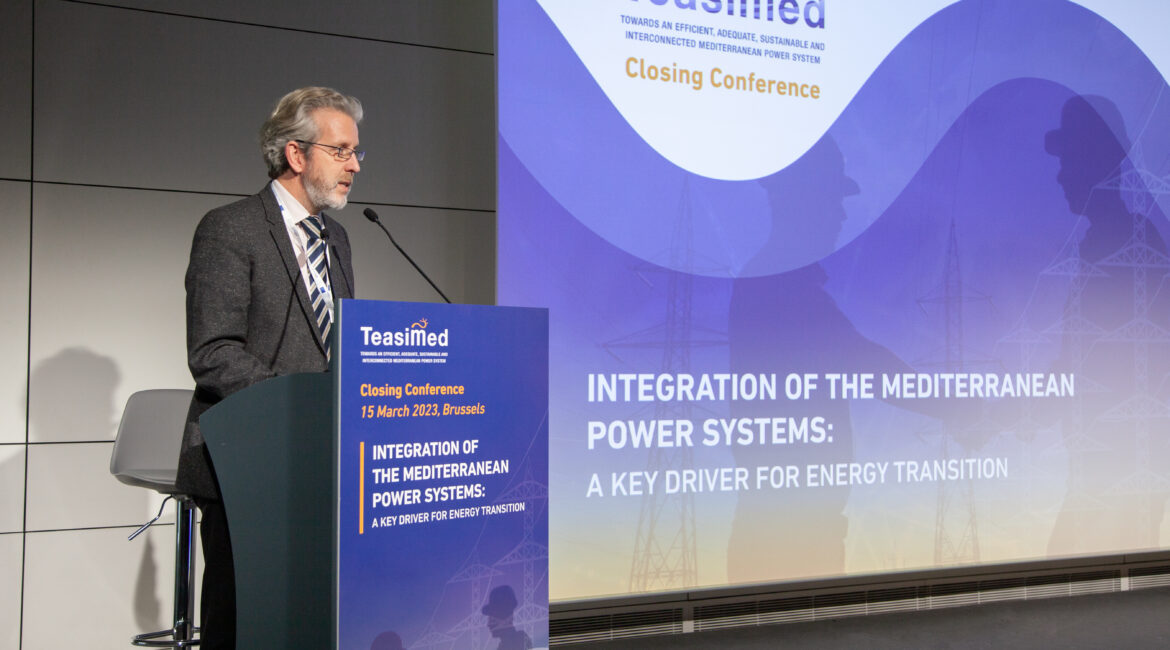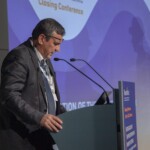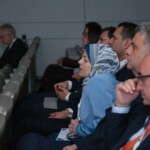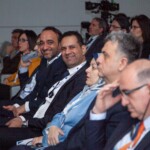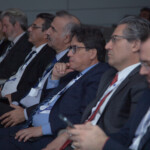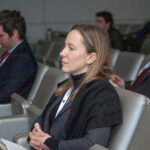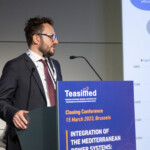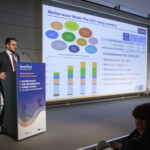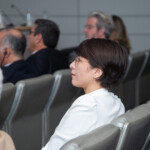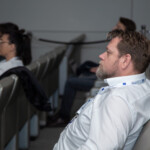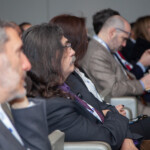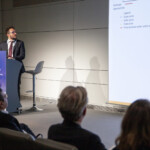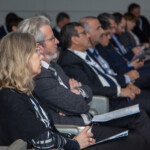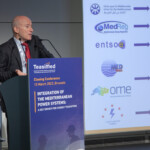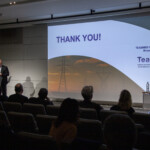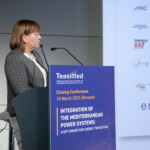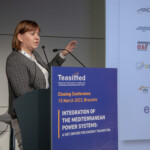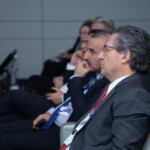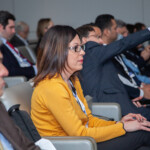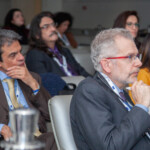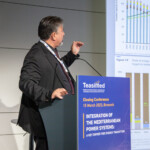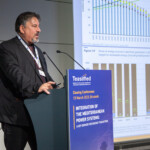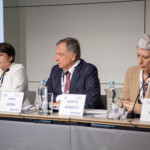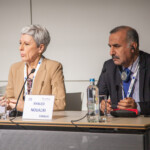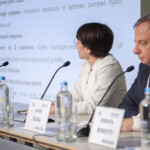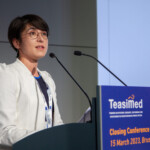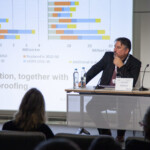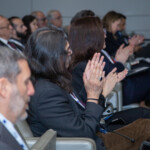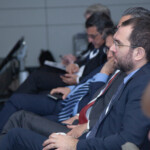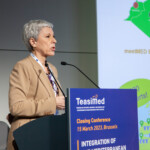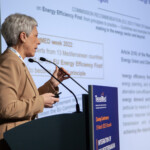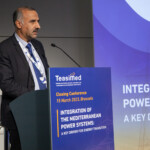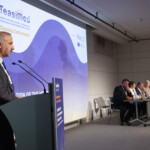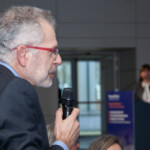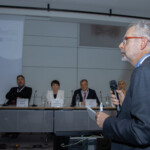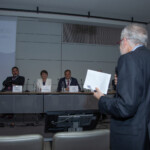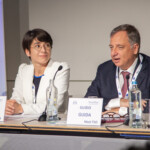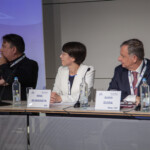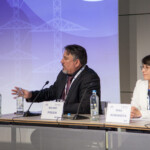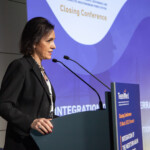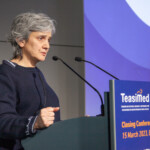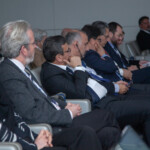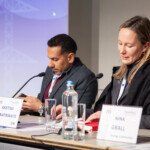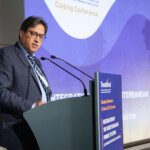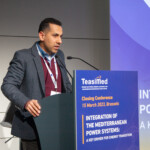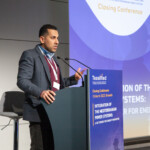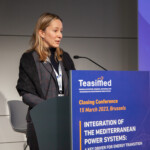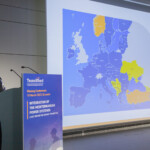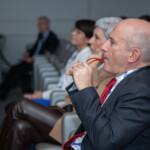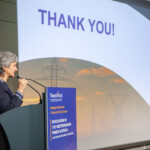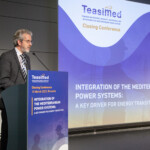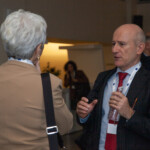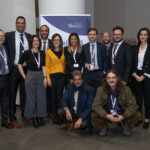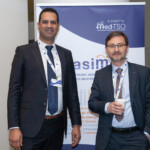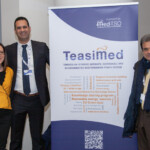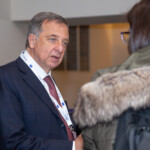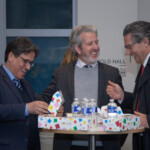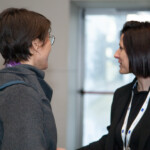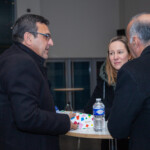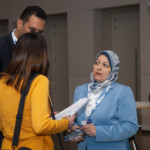Wednesday, 15 March 2023, Med-TSO held the conference “Integration of the Mediterranean Power Systems: a key driver for Energy Transition“, which marked the conclusion of its TEASIMED project – short for “Towards an Efficient, Adequate, Sustainable and Interconnected MEDiterranean power system“.
The event was the opportunity to briefly present the project outcomes and discuss how to accelerate the integration of the Mediterranean Power Systems in terms of infrastructure and policy developments.
Angelo Ferrante, Med-TSO Secretary General, and Luca Ruffino, Med-TSO Programme Officer, showed the highlights of the project and its main results, such as the updating of the Mediterranean Masterplan of the Interconnections, the adequacy assessments, the pilot projects in the south-east and west of the Mediterranean and the Mediterranean grid code. TEASIMED has been carried out for 31 months, starting 1 September 2020. It has successfully brought together experts from all corners of the Mediterranean thanks to multilateral cooperation and a full bottom-up approach.
Francesco La Camera, IRENA Director General, and Cristina Lobillo Borrero, EC DG ENER Deputy DG – Energy Platform TF, enhanced the conference by addressing keynote speeches.
La Camera affirmed how renewables would largely dominate the new energy system with unprecedented benefits, but that still need more investments to flow to less mature technologies and technologies such as storage, enabling power system integration. He defined Med-TSO’s inclusive approach as an excellent example of fostering dialogue and facilitating a collaborative transition that considers all stakeholders’ views. He also expressed confidence that tangible and effective solutions can be reached with collective actions.
Lobillo Borrero stated that a stronger regional integration of an efficient and stable Mediterranean power system is needed to generate clean energy. Better interconnecting both shores of the Mediterranean will be essential. At the same time, the EU needs to enhance the energy security of partner countries and support their clean, just and inclusive energy transition. She warmly thanked and congratulated Med-TSO for its important contribution to energy, dialogue and cooperation in the Mediterranean region.
The conference was closed by Cyril Dewaleyne, DG NEAR B2 Team Leader on Connectivity, Environment and Climate Action, and Programme Manager of the last three Med-TSO projects. He underlined the importance that Med-TSO work has for EU strategies. He recalled that the Mediterranean Masterplan of the Interconnections, whose updating is one of the primary outcomes of the TEASIMED project, is mentioned in the Joint Communication published in 2021 by the Commission and the External Action Service[1] because it already designed what could be the future in terms of interconnections. He also focused on the Italy-Tunisia interconnection project, which the EC sees as a game changer for building other new interconnections and strengthening the integration of the Mediterranean Power Systems. He concluded by confirming that the EC is glad to pursue the financing of the Teasimed 2 project for the coming three years.
First panel: “Leveraging interconnections for a sustainable energy transition in the Mediterranean”
This first panel of the conference intended to discuss the role of interconnections in driving a sustainable energy transition in the Mediterranean and the challenges and opportunities related to integrating Power Systems. It was opened and moderated by Sonya Twohig, ENTSO-E Secretary General, who stressed that Mediterranean projects must be sustainable and affordable at all points. She also mentioned that people working together to foster regional cooperation is fundamental to energy transition both in the Mediterranean and Europe. Furthermore, she recalled the long-lasting cooperation between ENTSO-E and Med-TSO, mainly focused on the exchange of data long-term scenarios of the grid, also fostered by having members belonging to both associations.
Roland Roesch, IRENA Acting Director, Innovation & Technology Centre, presented the advantages of cross-border power interconnection and highlighted how advanced digital technologies and regulations can help leverage interconnections. IoTs enable smart grids by collecting, transmitting and using large amounts of data, intelligently integrating grid-connected users, optimising grid operation and increasing system flexibility. Harmonised regional grid codes and digital technologies such as artificial intelligence can also support the decision-making process in operating and maintaining systems and implementing new market designs.
Rena Kuwahata, IEA Energy Analyst Power System Transformation, focused on regional interconnection. She defined it as a valuable tool to accelerate a secure and efficient transition to clean electricity. Its benefits are more comprehensive access to cheaper production, variability smoothing and adequacy and balancing reserves sharing.
Guido Guida, Med-TSO Vice-president and TERNA Head of International Public Affairs, underlined how the ELMED interconnector between Italy and Tunisia, financed by the EC in the frame of the Connecting Europe Facility (CEF) 2022, is a real game changer for the implementation of an integrated Mediterranean Power System. It represents a successful example of how to boost the integration of the Mediterranean region.
Roberta Boniotti, MEDENER Secretary General, recalled that the EU energy efficiency first principle has recently been given legal strength, with a clear requirement for EU countries to consider energy efficiency in policy, planning and major investment decisions in the energy sector and beyond. She pointed out how applying this principle across sectoral policies and investment decisions is at the core of energy system integration.
Khaled Nouasri, COMELEC Secretary General, gave an overlook of Comelec activities and affirmed that the harmonization of the regulatory and legislative framework to facilitate trading between different countries and ensuring access to affordable energy are the priorities to allow the emergence of the regional market.
Second panel: “Powering the Mediterranean: a partnership between Institutions, Stakeholders, and Associations”
The second panel brought together experts from the Mediterranean and neighbouring regions to discuss the necessary policy, financial and institutional initiatives to be set up to achieve effective integration of the Mediterranean power systems. Antonella Battaglini, Renewables Grid Initiative Chief Executive Officer, opened and moderated it. She emphasised how the energy transition is not simply an economic and technological transformation but a societal transformation, as energy, nature, and people belong together. She also pointed out that Europe and Africa need skilled forces to plan and deploy the future energy system. In these regards, energy collaboration between these regions must have a solid societal component based on education and capacity building to develop skills.
Abdellatif Bardach, MEDREG President, stressed the need to modernise the energy system and build strong partnerships to address the region’s energy challenges. In these regards, continually investing in the transmission, interconnection and distribution of various energy sources is crucial to ensure transparent, non-discriminatory and harmonious regional markets. These aspects will largely contribute to creating integrated regional markets that leverage the abundance of natural sources in the area and attract investments and financing.
Mohammed Elhusseiny, UfM Energy Expert/Energy & Climate Action, pointed out how the speed of transition is critical in powering the Mediterranean. Bridging the existing gap from country to country can only be achieved by continuously bringing people together and offering various cooperation opportunities to generate discussion and win-win solutions to speed up the transition and reach sustainability. He also took the opportunity to promote the forthcoming UFM Energy Platforms annual meeting scheduled for May, where issues related to interconnection, finance, and increasing public and private sector participation will be discussed.
Kristina Kanapinskaite, EIB head of the Public Sector South division, brought the perspective of the International Financing Institutions into the discussion. The European Investment Bank is a major financier of sustainable infrastructure energy projects in Europe and outside its borders, lending an average of €3.5. Billion a year for networks and interconnections. Stakeholder engagement and harmonisation are among the main challenges observed in their energy investments.
She addressed the importance of creating a more integrated Mediterranean energy market to cope with fast-growing energy demand and the need for energy security on both seashores. All whilst favouring low carbon and renewable energy sources and unlocking energy efficiency where possible.
Nina Grall, Energy Community, Head of the Energy Community Regulatory Board (ECRB) Section, concluded the panel by recalling how the crucial starting point of interconnections should always be looking into what is needed to operate systems safely and stably and then apply common operational standards. The need to focus first on the operational dimension comes from the fact that when there is market interest, willingness and political commitment, joint projects can be realised, even without having the same legal basis or market development status between countries.
Check out the photo gallery
[1] Joint communication to the European Parliament, the Council, the European economic and social committee and the Committee of the Regions – Renewed partnership with the southern neighbourhood – A new agenda for the Mediterranean, page 46.

